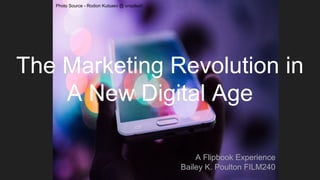
The marketing revolution in a new digital age flipbook by bailey k poulton film240
- 1. A Flipbook Experience Bailey K. Poulton FILM240 The Marketing Revolution in A New Digital Age Photo Source - Rodion Kutsaev @ unsplash
- 2. The New Digital Age The New Digital Age ushers in the shift of traditional industry, bringing society into an era that is based around media use and technology. (1) The surge in mobile device and internet use has revolutionized media use and the marketing and advertising industry. Photo Source-William Iven @ unsplash
- 3. The Adult Average Media and Online Use: 27 hours 49 minutes online 92% use a computer 84% of young adults use smartphones 42% of adults use a tablet (2) Photo source - internet marketing secrets @ Flickr
- 4. Multi-tasking across several screens simultaneously, users are more connected than ever before. At the present moment I am online using my computer to create this book, streaming a netflix show on my television and snapchatting with my sister on my cell. Photo Source - William Iven @ unsplash
- 5. Adapting to a tech savvy society In a society that is consumed by technology media, the strategies of marketing and advertising specialists have evolved to adapt. Old-school advertising methods would no longer suffice, media use and exposure to advertisements have changed. The internet and mobile devices give consumers 24/7 information access. Marketing strategies have adapted to redefine the consumer/product relationship. (3) Photo Source - Trey Ratcliff @ Flikrr
- 6. There are challenges for advertisers trying to convey their message online, users either skip, block or disregard them all together. 84% millennials don't even notice the advertisements online, they have learned to block them out. Photo source - Caleb Woods @ unsplash “Online ads are intrusive, obnoxious and annoying” (3)
- 7. “Publishers must make money, but the reader must not be overly annoyed” PageFair is one solution to the adblocking, providing data to publishers about which types of ads are being blocked most and what it’s costing them. They have developed new technology to allow publishers to display ads deemed acceptable that meet strict criteria.(4) The marketing industry has found its own solutions... Photo source - hugh grew @ Flickrr
- 8. “Users are inadvertently putting their favorite websites out of business” Ad blockers create pressure for advertisers, an estimated $21.8 billion of global ad revenue will be blocked this year.(4) Marketers have come up with their own solutions to the problem. Relying more on native advertising and developing a more intimate relationship with consumers.(3) Photo Source - Maria Victoria Heridia Reyes @ unsplash
- 9. “The term native advertising likely stems from the convergence of advertorial concepts and the social media environment” (5) Photo source - Jack Flanagan @ Flickr
- 10. These ads offer consumers more control over which brands they communicate with and what social network platform will be used. This is the “ultimate form of a consumer-brand relationship” (5) Photo source - Stillgherian @ Flickr
- 11. Ads appearing in stream and must reduce disruption be relevant and blend into the context. Advertorials mirror the surrounding content users may not be aware that they are viewing an ad. Without discloser however, consumers will feel decieved and annoyed by the ad.(5) Photo source - Lois Scallan @ Flickr
- 12. Product Integration We see on reality tv and movies corporate sponsorships, logos and brands plastered on venues and participants so they are received as relevant and non intrusive. The result is a subtle “branded entertainment experience” where the distinction between advertising and content fades.(3) Photo source - Laura H Knight @ Flickr
- 13. Advertising has become content and can be seen as must see programming. If successful, ads will be considered ‘status update worthy’, the key to social relationship marketing. (3)
- 14. With more internet users than ever before, respectfully increased is social media users. Marketing and advertising strategies utilize social media to connect with consumers on a more personal level in a what is percieved as a mutually beneficial relationship. Photo Source - William Iven @ unsplash
- 15. Photo source - Yoel Ben-Avraham @ Flickr “Advertisers are embracing the conversation with customers over social media” (6)
- 16. Real time communication via social media In response to a power outage at the 2013 superbowl, oreo used social media to respond to the situation and relate with consumers, “Power out? No problem, you can still dunk in the dark”.(6)
- 17. M&Ms created a real time campaign for super bowl 2014, featuring Yellow and Joe Montana that would publish live game commentary across an array of social media platforms.(6) Photo source - Mark Mizuno @ Flickr
- 18. As advertising becomes more unified with content, consumers are also becoming more a part of the brands story. Consumers want to share their experiences and feel heard (3) Photo source - Funkyah @ Flickr
- 19. Posting images on social media sites to share their experience. “My Breakfast on Exam Day” shows the brand Red Bull as a love mark,triggers an emotional response and connects consumers to the brand and to each other.(7) Photo source - Allie Graham @ Flickr
- 20. Media and online use has evolved in this new digital era, allowing users to become more connected to each other and develop a more personal relationship with brands . There is much excitement to see the outpour of marketing creativity that is yet to come, but this does not come without a need for caution from consumers. The End.
- 21. References 1- https://en.wikipedia.org/wiki/Information_Age 2-http://www.theglobeandmail.com/report-on-business/industry-news/marketing/four-ways-canad ians-are-consuming-media-differently/article21949630/ 3-module 2 lecture 1 4.http://www.cjr.org/business_of_news/will_ad_blockers_kill_the_digital_media_industry.php 5.http://www.sciencedirect.com.proxy.queensu.ca/science/article/pii/S0007681315000841 * 6.http://go.galegroup.com.proxy.queensu.ca/ps/i.do?p=CPI&sw=w&u=queensulaw&v=2.1&id=GALE%7C A357218028&it=r&asid=5ca8b18d1e7c7674fa4d7d6ba9738cd9 * 7.https://hbr.org/2014/02/the-eight-phases-of-brand-love